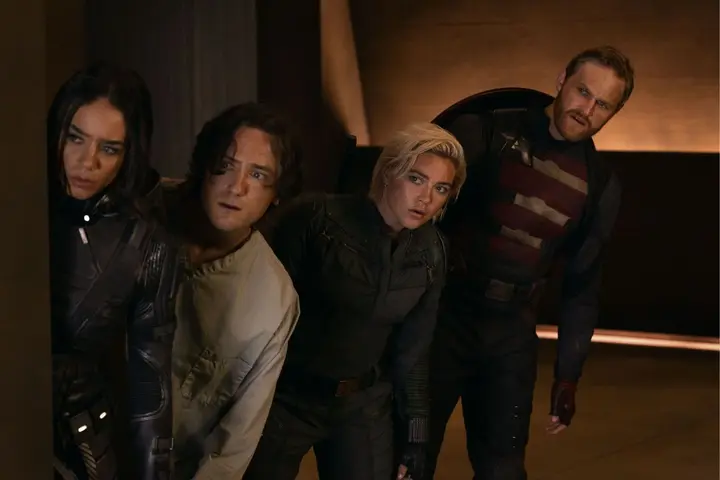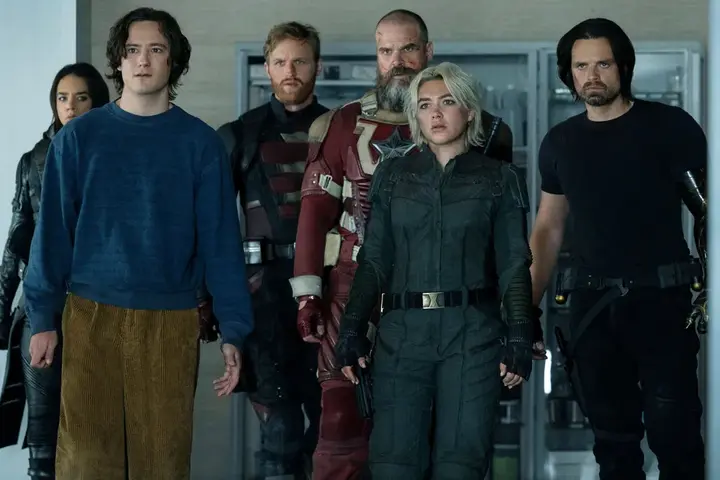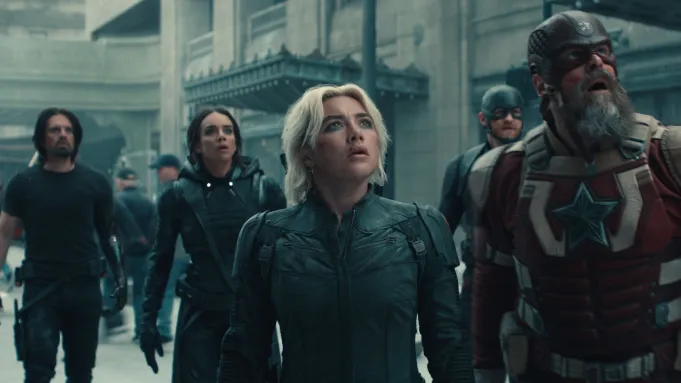Let’s get one thing clear at the jump: I liked Thunderbolts*. It falls apart towards the end, and the needs of the franchise require it to make some emotional sacrifices. But I was never all that bored, and at one point I found myself crying. The most popular MCU films tend to be little more than tediously entertaining, but Thunderbolts* is often flat-out entertaining.
Jake Schreier finds neat ways to flex his music video chops but it’s the script that allows the characters to take a breather and unpack their emotional burdens. However, there are certain things that have an inherent cinematic quality: Jackie Chan, Alan Ritchson killing nazis, baseball, Sydney Sweeney walking across the screen, and Florence Pugh zooming back and forth across the screen like a blonde cannonball into whichever feckless thug that has the misfortune to try and fight a Black Widow. Sadly, Thunderbolts* only has the latter. But it’s more than most MCU movies have.

Thunderbolts may whiff the landing, but its attempts to mine the trauma of its characters for something more than CGI himbos swinging at each other is refreshing. Eric Pearson and Joanna Calo’s script is rare for the MCU in that it really is more concerned with what makes these characters tick more than finding ways to connect the movie to a wider franchise-until that ending. Most of the characters anyways, Hannah John-Kamen’s Ghost gets short-shrift, her moments often truncated.
The real star of the show is the aforementioned blonde boomerang, Pugh. Yelena is far and away the most popular character post Endgame aside from Iman Vellani’s Kamala Kahn- a character that along with Hailee Steinfeld’s Kate Bishop I would kill to watch in a team-up. Pugh and David Harbour’s Alexei, the hapless Red Guardian, are the driving emotional forces.
Harbour and Pugh carry over their work from Black Widow as a pair of damaged Russian assets who are, for all the world, father and daughter, even if their relationship was only a cover. Both are grieving over the death of Natasha who was killed because the screenwriters of Endgame were lazy. They needed to kill a woman and Natasha was right there. Also her contract was up. But I’m not bitter.
But what makes Thunderbolts* work is how Schreier gets out of the way of the script while also understanding that cameraperson Andrew Droz Palermo’s job is more than merely recording the action. Much like Black Widow and The Eternals, and parts of Doctor Strange 2: The Multiverse of Madness and The Marvels, Thunderbolts* feels like a movie and less like a filmed radio play. Partly because Harbour and Pugh have such wonderfully expressive eyes, but also because Schreier and Palermo do an effective job of using the muted aesthetic to emphasize the emotional ennui the characters are feeling.
For once, the muted color palette feels intentional and not in the boring “we wanted to make the fantastical world of superheroes more boring” kind of way. In addition, the action and stunt work has a grandiosity, along with a confidence to it that, if there is CGI work, it is not an eyesore. Plus, you actually get to see the punches and kicks land! The action is allowed to flow freely. Granted, it never really has the imagination of the space station fight of The Marvels, a movie I still have not forgiven the American public for failing.
Still, Pearson and Calo’s script relies on the characters for comedy rather than formulaic quips. The comedy comes from Yelena being embarrassed that she has to be rescued by Alexei rather than a corny one-liner after a serious moment. A formula that has been around long before the MCU, but that the franchise has abused to the point of irritation.

But Schreier and Palermo really shine during the final reel. The visual imagination combined with old-school matte-paintings, are the most visual life we’ve seen since The Marvels. (I didn’t see Captain America: Brave New World because, despite what the marketing department tells you, you don’t have to see every one of these. Free yourselves!) It doesn’t set the world on fire, but it is an honest to god attempt at using visuals to tell a story the likes of which we are not accustomed to seeing in the MCU-at least on the big screen. It is, more than anything, a moment in which Thunderbolts* feels cinematic while also feeling rooted in comic book imagery and at times even anime.
Pearson and Calo’s script is more textured than the average MCU film, giving the emotional baggage and cinema therapy more heft simply because these characters have done very bad things, and it weighs on them. Cleverly, the script never asks the characters to be forgiven for their crimes, so much that it shows how they have to forgive themselves and take responsibility.
Something that the former new Captain America, John Walker (Wyatt Russell), struggles with mightily. Next to Ghost, his moments are the most shallowly mined. But I appreciate the attempts of both the script and Schreier to try and definitively settle the argument of whether or not John Walker is a good man. He’s not. But he can be.
There’s a telling scene between Walker and Bob (Lewis Pullman), a character I can not divulge too much about because the current attitude on spoilers is borderline Kafkaesque absurd. The scene is brief but telling and shows the economy of the screenplay and direction. Not just because of Bob’s cutting comment, but because of how Schreier allows us to see Russell’s face, as we realize he knows he’s a bad guy, and he doesn’t know how he got there.
My favorite bit in the movie is the revelation that Bucky Barnes (Sebastian Stan) is a freshman Congressman for Brooklyn. Man, I would have loved to see the election campaign. Imagine losing to a guy who was a brainwashed Hydra (read: nazi) agent responsible for an attempted coup and the death of countless Americans. Still, I shouldn’t be surprised, after all, it’s hardly any more far-fetched compared to who we elected president.
Stan’s Bucky is a character I’ve never really cared for. Of all the Captain America characters I wanted to follow, I was always an Agent Carter man. But Thunderbolts* finds new life for the character, even if he does feel underused. His side story with Geraldine Viswanathan’s Mel, Valentina’s assistant, never really pays off in a satisfying way because Mel feels so one note.
Viswanathan tries her best, but one of the failures of Pearson and Calo’s script is that some characters are there but don’t feel necessary. So its not that unique of an MCU movie in that regard.
Though Scherier allows Louis-Dreyfus to do a terrific heel turn as Valentina. She’s currently facing impeachment hearings as the head of the CIA. A former head of a shadowy organization facing charges of corruption of a shadowy government organization is a nice touch. Kudos to Pearson and Calo for being one of the few MCU films that feels to be in conversation with the world in which the movie was made.
Don’t get me wrong, it’s ultimately gutless, and aims to please the holiest of holies, all four quadrants. The parts that work are the ones that feel like mass therapy for the audience. The scenes between Yelena and Alexei being the real base-stealers. Yet, Thunderbolts* is at times too glib, but that’s a franchise-wide issue.

The other franchise issue is how the ending all but craps the bed. It saps all the air out of Thunderbolts*. While I’m sure the fans will go gonzo over the reveal, it is the least interesting aspect of the film for me. But more than that, it feels anti-climactic. I don’t care if the MCU is in on the joke-the joke falls flat. The end credits lean into the joke, and while the artwork is fine feels as if the filmmakers overestimate the importance of news magazines in modern cultures.
There has been some discussion online whether or not the MCU has entered its flop era. I do not agree, in fact, I have found most of the current crop interesting-even the failures. Except for The Marvels, the only real failure there was the audience showing up. The recent failures have come at the cost of trying to do something different. Thunderbolts* is pretty good for a Marvel film, but could have used more Yelena barreling across the screen-or more Brie Larson.
Images courtesy of Walt Disney Studios Motion Pictures
Have strong thoughts about this piece you need to share? Or maybe there’s something else on your mind you’re wanting to talk about with fellow Fandomentals? Head on over to our Community server to join in the conversation!

